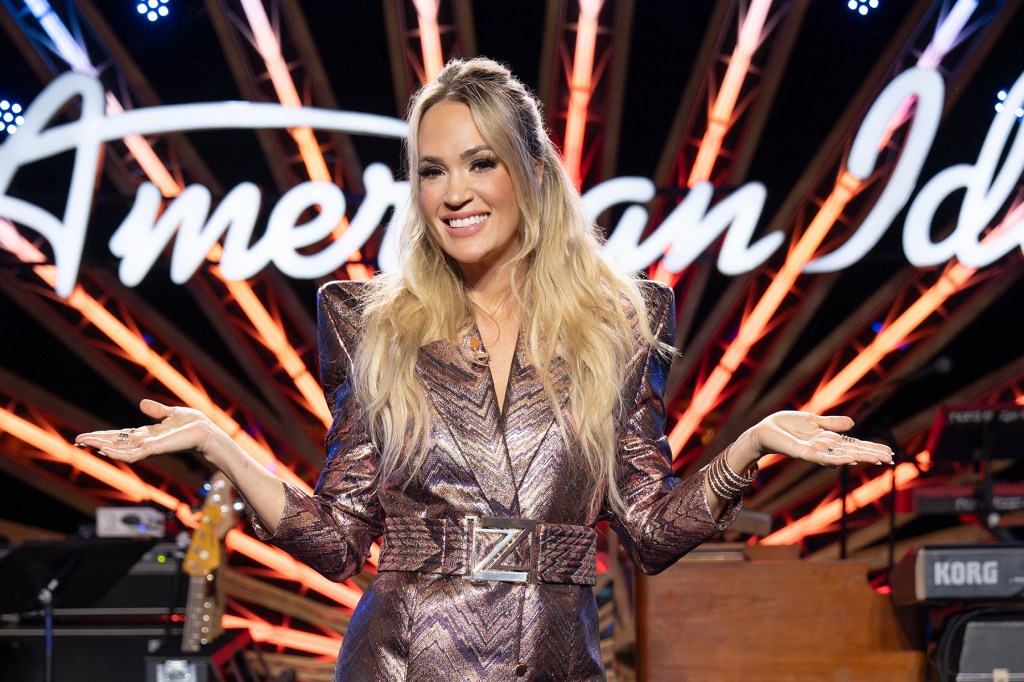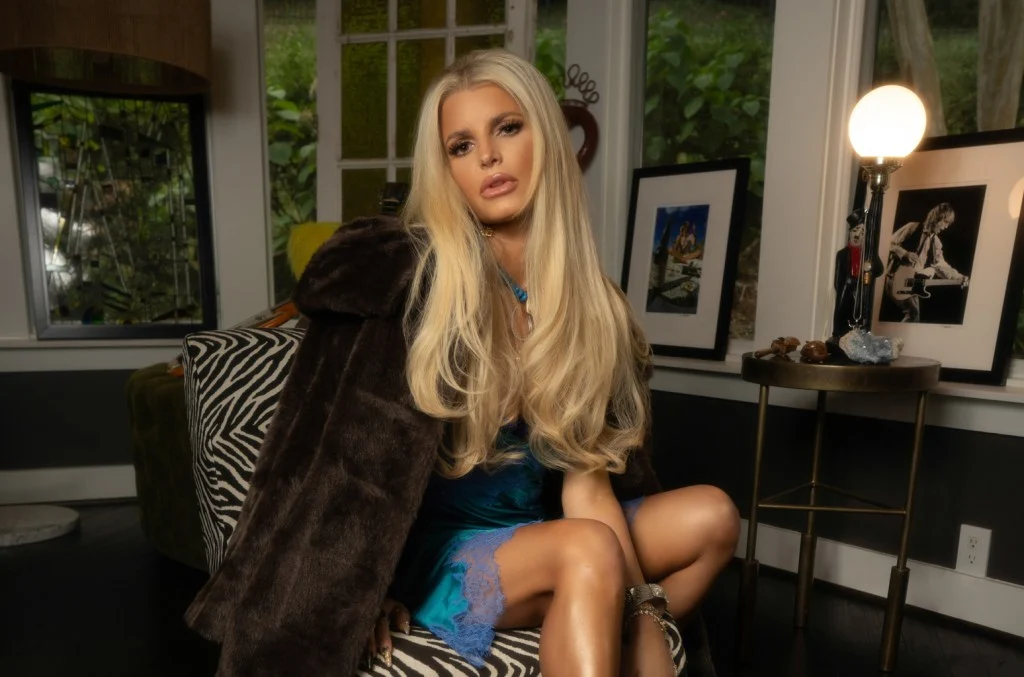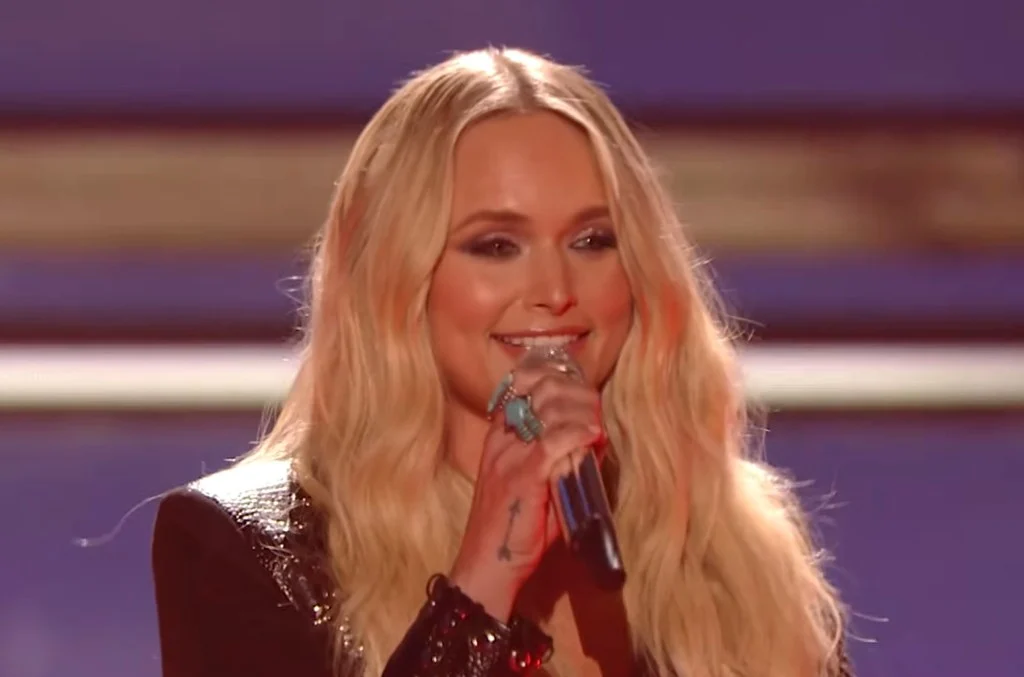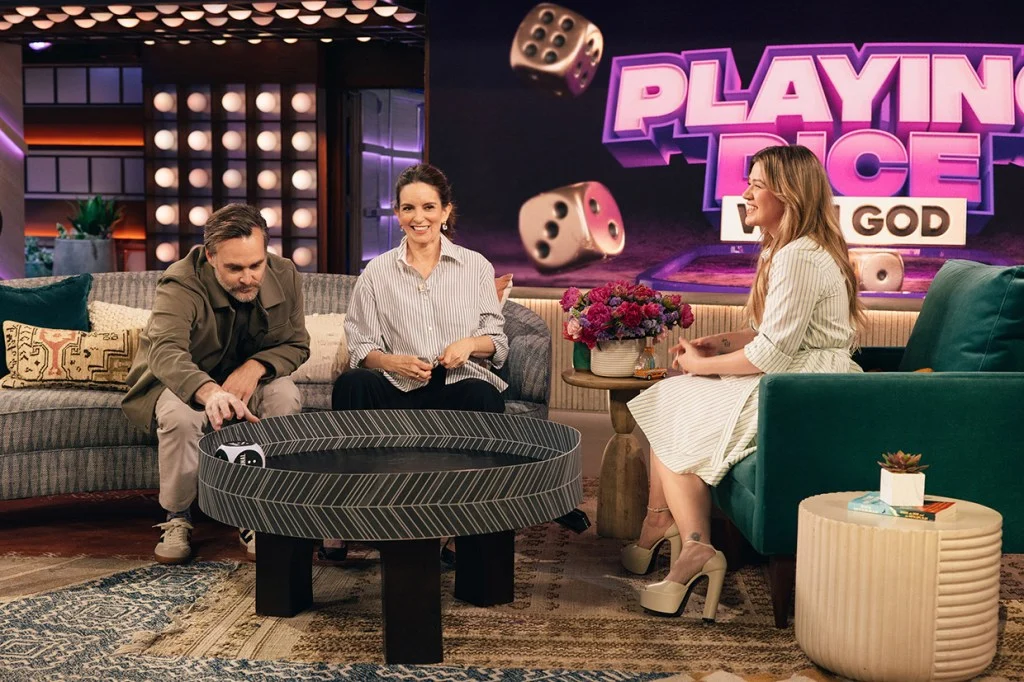American Idol
Trending on Billboard
Carrie Underwood is an eight-time Grammy winner, a three-time ACM entertainer of the year winner, an American Idol judge, an actress and a businesswoman — and she’s also a mom to two sons, Jacob and Isaiah. Thus, Underwood is well-acquainted with the scourge facing countless parents right now: Kids’ obsession with the phrase “6-7.” The trend has become so popular, in fact, that it was named Dictionary.com’s Word of the Year.
During a preview clip for American Idol‘s upcoming season, Underwood greets a contestant on the show, Uzziah Hutchinson, who works with kids and references the popular catchphrase.
“I bet you get a lot of funny stories,” Underwood says, with the contestant replying, “Right now, it’s ‘6-7.’”
Immediately, Underwood begins mimicking the hand gesture that goes with the catchphrase, which is wildly popular with school-age kids. “6-7” originally came from the song “Doot Doot (6 7)” by rapper Skrilla, in reference to NBA star LaMelo Ball’s height, but it’s mostly just become extremely popular for students to repeat — and an annoyance for many parents and teachers.
Fortunately, Underwood has a scheme to get the “6-7” craze to halt.
“Here’s how we stop that, Uzziah. I have the cure,” Underwood says. “Every time the kids say ‘6-7,’ we have to immediately say [singing], ‘5-3-0-9,’” she says — referencing Tommy Tutone’s Billboard Hot 100 top five hit “867-5309/Jenny” from 1982.
“That’ll work!” Uzziah said.
“And if we all band together and do that, it will stop,” Underwood insists. “It’s gonna take all of us.”
Season 24 of American Idol will launch on Jan. 26 — exactly 67 days from now — welcoming back Underwood as a judge alongside Luke Bryan and Lionel Richie. The music competition airs on ABC and streams on Hulu.
See the American Idol preview clip below:
Randy Madden, a singer who competed on season eight of American Idol, was arrested in Ventura County, Calif., and is facing multiple felony charges.
According to court documents viewed by Billboard, the 45-year-old musician faces six felony charges, including unlawful sexual intercourse with a person under the age of 18, as well as sending harmful matter, luring and dissuading a witness from reporting a crime. He has pleaded not guilty to all the charges. Public online records show that the date of violation was July 21, and he was taken into custody on Oct. 30 before being released on bail early Tuesday (Nov. 4) morning after paying a $100,000 bond. A criminal protective order has been filed for the victim, according to court records.
Madden’s next hearing for the case will take place on Nov. 13, with a second hearing set for Nov. 17.
Billboard has reached out to the Ventura County Police Department, the district attorney’s office and Madden.
The aspiring rock star tried out for Idol in 2008, back when the program still had its original lineup of judges Simon Cowell, Paula Abdul and Randy Jackson. He never made it past his first audition, earning unanimous “No” votes from the trio after performing Bon Jovi’s “Livin’ on a Prayer.” Cowell was especially tough on him, calling Madden — who had started to cry — “cliche” and a “drama queen.”
Kris Allen would go on to win the season.
Before his brief time on Idol, Madden played in a band called Sexual Harassment. In August 2024, he started a GoFundMe to help cover his living expenses and medical costs after suffering severe complications from a ligament replacement surgery he’d had on his left leg in May of that year. He was still seeking donations this past June, at which time he shared that he still couldn’t walk without crutches or a cane and anticipated needing at least two more procedures to treat the issue.
American Idol is now on its 24th season, which will premiere in January next year with judges Lionel Richie, Carrie Underwood and Luke Bryan.
If you or anyone you know has been sexually assaulted or abused, contact RAINN’s National Sexual Assault Hotline for 24/7 support and resources at 800-656-HOPE or via the website.
All products and services featured are independently chosen by editors. However, Billboard may receive a commission on orders placed through its retail links, and the retailer may receive certain auditable data for accounting purposes.
Another American Idol finale is almost here. Season 23 premiered on March 2 with hundreds of auditions, and now, just three artists are left. The finale will not only feature performances from the top three singers — Jamal Roberts, Breanna Nix and John Foster — but will also have a wide range of special guests that will take the stage on Sunday including: Jelly Roll, Jessica Simpson, Salt-N-Pepa, Goo Goo Dolls, Josh Groban, Patti LaBelle and more.
Explore
Explore
See latest videos, charts and news
See latest videos, charts and news
In addition, the three Idol judges Luke Bryan, Carrie Underwood and Lionel Richie will perform together. To make sure you don’t miss a moment of this jam-packed finale, we’ve gathered all the information you need to tune in to American Idol this weekend.
Trending on Billboard
When Is the American Idol Season 23 Finale?
The American Idol season finale airs live coast to coast this Sunday, May 18, at 8 p.m. ET/5 p.m. PT. It’s a three-hour event, so that means the winner won’t be announced until around 11 p.m. ET/8 p.m. PT.
Who Are the Top 3 Contestants?
The top 3 artists looking to become the next American Idol are Jamal Roberts, Breanna Nix and John Foster. Who will take home the coveted title?
How to Watch the American Idol Season Finale
The season 23 finale of American Idol airs Sunday at 8 p.m. ET/5 p.m. PT on ABC. Because the show is on network television, you can watch with an indoor HD antenna, and through cable, satellite or a streaming subscription that has ABC.
If you’ve been itching to getting rid of cable, but don’t want to end up spending hundreds of dollars a month, there are a few ways to watch American Idol online without needing cable.
We like DirecTV, which offers access to 90+ channels, including ABC, NBC, CBS, Fox, ESPN, HGTV, MTV, AMC, A&E, TLC, ID, OWN, CNN, Univision and more, plus thousands of movies and shows on-demand. The subscription is free trial for five days, so you can stream American Idol and other shows for free for a limited time.
You can also watch American Idol online through a streaming service like Fubo and SlingTV, which both offer a live feed of ABC as part of its channel lineup. Fubo has a seven-day free trial that you can use to livestream American Idol online free.
How to Watch American Idol on Hulu
Those who miss Sunday’s episodes can stream it on Hulu the next day. Not subscribed? Hulu’s most popular plan is currently $9.99 per month after a free trial. Hulu also offers ad-free streaming for $18.99 per month, plus student discounts and bundle deals with Disney+ and ESPN+.
The best deal right now is this Disney+ and Hulu bundle, which is discounted to just $2.99/month for your first four months. See more details here.
Looking for live channels? Hulu + Live TV gets you 90+ channels, along with access to Hulu, Disney+ and ESPN+ for less than $90 a month. You can watch American Idol on Hulu with a live ABC feed.
Stream network TV shows, cable, sports and more with Hulu + Live TV, in addition to tons of movies and Hulu exclusives such as Sho-gun, Thank You, Goodnight: The Bon Jovi Story, The Bear, Black Twitter: A People’s History, Only Murders in the Building, The Handmaid’s Tale, Death & Other Details, The Kardashians and more.
Hulu subscribers can add Starz, Max and other channels to Hulu, create up to six profiles under one account and stream from up to two different screens at the same time.
The winner of American Idol typically receives a cash prize and gets offered a record deal, though the exact details of this year’s prize has yet to be announced. Watch American Idol online with a free trial to Fubo here.
A wide range of guest performers will hit the American Idol stage Sunday alongside this year’s top 14 contestants ahead of the live crowning of the 2025 winner during the three-hour finale, Ryan Seacrest announced on Monday’s (May 12) live episode. Sunday’s performers include: Brandon Lake, Goo Goo Dolls, Good Charlotte, Jennifer Holliday, Jessica Simpson, […]
American Idol has narrowed its field to seven finalists following Monday night’s (May 5) episode, which featured a surprise save and another emotional elimination.
Explore
Explore
See latest videos, charts and news
See latest videos, charts and news
The remaining contestants include Jamal Roberts, Mattie Pruitt, and five others vying for the season 22 crown.
Mattie Pruitt, who landed in the bottom two alongside Josh King, was saved by the judges, a decision that meant King was eliminated from the competition. Pruitt performed “Always Been You” during the episode, which featured each contestant selecting one of three songs secretly chosen by judges Carrie Underwood, Lionel Richie or Luke Bryan.
The remaining contestants advancing to the top seven are Breanna Nix (“Independence Day”), John Foster (“I Cross My Heart”), Gabby Samone (“Hero”), Jamal Roberts (“I Believe”), Thunderstorm Artis (“Faithfully”) and Slater Nalley (“Atlantic City”).
Trending on Billboard
“This gave me a wonderful experience performing in front of massive live audiences again,” contestant Josh King said after his elimination. “I got to feel crowds again. It’s such a wonderful feeling.”
The competition is intensifying for the seven finalists, with Roberts saying, “It’s basically how bad do you want it at this point,” he said. “I want it real bad, so I gotta keep pushing and keep doing what I’m doing now.”
Host Ryan Seacrest praised the season’s talent, noting that the judges, Carrie Underwood, Luke Bryan and Lionel Richie, have been particularly moved by this year’s performances. “I think they have been emotionally moved more so by these performers than maybe ever in the past,” Seacrest observed.
Underwood added, “I want them to shine. I feel like that’s where we’re all coming from. We want these hopefuls to do a great job.”
Looking ahead, American Idol will stage two nights of Disney-themed performances beginning next week. Lin-Manuel Miranda, the Tony, Grammy and Pulitzer-winning creator of Hamilton and Moana, will serve as the contestants’ mentor.
The Disney episodes will also feature double eliminations. On Sunday, the top seven will be whittled down to five contestants. By Monday, only three will advance to the grand finale.
The American Idol season 22 finale is scheduled to air later this month on ABC.
It was fitting that Miranda Lambert was on hand for Sunday night’s (May 4) “Iconic Women”-themed night. As the show’s top 10 competed for a spot in the top 8, Lambert was in the house for a killer performance of one of her breakthrough hits and to offer advice and encouragement to the singers, beginning with country crooner John Foster, who admitted that the singer was his “first crush.”
They clearly got along like old friends, with country gentleman Foster even taking off his cowboy hat in deference to Lambert, who counseled him to work the stage a bit as they did an impromptu duet on Bonnie Raitt’s “Something to Talk About.”
Lambert wasn’t done singing, though, as she had her own spotlight moment later in the show when she took the stage to perform her breakthrough 2005 hit single, “Kerosene,” which peaked at No. 61 on the Billboard Hot 100 and Nov. 15 on the Hot Country Songs chart. The song, which was the third single and title track of Lambert’s debut album, has lost none of its rocking vibe in the ensuing two decades.
Trending on Billboard
“Dusty roads ain’t made for walking/ Spinning tires ain’t made for stoppin’/ I’m giving up on love ’cause love’s given up on me,” Lambert sang over her band’s foot-stomping backing, as, following her own advice, she worked the stage in a rhinestone-studded black jumpsuit while the giant screen behind her featured the tune’s title in flaming letters.
Fellow country stars and Idol judges Carrie Underwood and Luke Bryan clapped and bopped their heads to the song’s driving beat and gospel-flecked keyboards. Afterwards, host Ryan Seacrest asked Lambert how her mentoring run on the show has been going and she said, “I love them all so much. I’ve had such a blast getting to be part of this Idol family and getting to know these wonderful artists. It has been a real blessing for me.”
Lambert also plugged her new record label, Big Loud Texas, where she said she’s trying to keep the “outlaw movement going.”
Other top 10 performances on the episode included: Kolbi Jordan (Fleetwood Mac’s “The Chain”), Josh King (Adele’s “Rolling in the Deep”), Breanna Nix (Adele’s “Water Under the Bridge”), Canaan James Hill (Carrie Underwood’s “Love Wins”), Thunderstorm Artis (Adele’s “When We Were Young”), Slater Nalley (Reba McEntire’s “Whoever’s In New England”), Jamal Roberts (Underwood’s “Undo It”), Mattie Pruitt (Lambert’s “The House That Built Me”) and Gabby Samone (Beyoncé’s “I Was Here”).
Idol winner Abi Carter also returned during the episode to sing her new ballad, “Burned.” By show’s end, the top 10 was cut down to the top eight, with Jordan and Hill eliminated. The next episode of Idol, the judge’s song contest, airs on Monday night at 8 p.m. ET, where America will vote for the top six and the judges will use their save to complete the top seven.
Watch Lambert perform “Kerosene” on American Idol below.
When it comes to the prospect of being trapped on a deserted island, Kelly Clarkson would want to be with a fellow American Idol alum. The hypothetical scenario came up on Thursday’s episode (May 1) of The Kelly Clarkson Show during a round of “Playing Dice With God,” with guests Tina Fey and Will Forte. […]
Born: Aug. 22, 2001 – Cairo, EgyptMusical Influences: Whitney Houston, Aretha Franklin, Mariah Carey, Celine DionCurrently Listening To: Bruno Mars, Beyoncé, AdeleFirst Idol Experience: “I’ve been watching since I grew up in Egypt. As a little kid I was pulling up videos of the show any way I could. I remember Carrie [Underwood’s] journey, the compilation of every performance of hers. And Kelly Clarkson and Fantasia.Favorite Alums: Kelly Clarkson, Fantasia, Carrie Underwood, Ruben Studdard, Katharine McPhee, Phillip Phillips, La’Porsha Renae, Quintavious, Roman Collins
For the first seven years of his life, Filo lived with his family in Egypt, where he was introduced to music by the hymns at his Coptic Orthodox Christian church. “It was very much traditional, group singing with just melody, no instruments. That is where I started using my voice, but I didn’t put any thought into it. It wasn’t until I was 10 years old and my brother started downloading music on our iPad where I was introduced to mainstream music. That’s when I first got to hear Mariah Carey, Bruno Mars, John Legend and Meghan Trainor. From there, I sang in the shower and then my uncle said to my mom, ‘Are you hearing this?’”
But Filo says he never got approval for his “shower shows.” “We had moved to Abu Dhabi and there was a church choir we had put together. I loved the message of one particular song and auditioned to sing the solo. A lot of heads turned around when I started singing and that’s when I noticed, ‘Wow, maybe there’s something there. I love this. I love singing for people.’”
Filo’s mom, who has been an emotional presence on Idol this season, realized her son was interested in music and arranged for him to have voice and piano lessons. “That didn’t last long because after two months we moved to the States,” says Filo.
It was a turbulent time for the family. “There was a big revolution in Egypt where Christians were targeted. They burned mom’s hometown church in Minya down. We were lucky to get a visa to the States from the UAE. Luckily, the U.S. opened its doors and now we’re citizens, which is great.”
Along with his mother and older brother, Filo relocated to San Francisco. “It took a minute for me to fit in. Society here is so different to how it was back home and it was really a challenge finding a community. Luckily there were a few Coptic churches around where we lived, so it was slightly easier to transition. I was this awkward kid in eighth grade until I saw a poster for a school musical. I didn’t even know what a musical was. But I thought I would audition for it – it was the junior version of Shrek the Musical.”
Filo says that everyone else was prepared for the audition but he didn’t know any of the show’s songs and so tried out with Bruno Mars’ “When I Was Your Man.” And then? “I got the part of Shrek! That’s when I first felt like I belonged. People enjoyed what I was doing and I thought, ‘This is what I’m meant to do.’”
Moving on to high school, Filo was cast in all of his school’s musicals: Urinetown, In the Heights, Grease and Rent. He joined the choir and competed in local and national choir competitions, including one at Carnegie Hall. “In high school, everything revolved around my music activities.”
Filo was then accepted by the University of the Pacific in Stockton, Calif., where he studied classical music. But people back home had other expectations. “In Egypt, there are only three acceptable careers: Engineer, doctor or lawyer. That’s it, and nothing else matters. The most random people would come up to me and say, ‘So you’re doing this music thing, but what are you actually doing?’ ‘No, I’m doing music.’ ‘As a hobby. So what are you actually doing?’ I’d reply, ‘Great, thank you for your input.’ I didn’t know what to tell them.”
As a result, Filo studied for a music degree while also following a premed route. “Then, in my senior year, COVID happened.” That’s when Filo told his family he was going to dedicate his life to music.
Being on Idol has reinforced that decision. “I’ve learned how much I love to do this. This has not been an easy journey. You’re putting yourself out there for people to criticize and to have opinions. Often people don’t see the vision that you’re seeing or they’re not seeing the career that you want to have. Choosing music has proven to me how resilient I can be. It affirms not just my singing ability, but my character. Like, I’ve got this. No matter what happens on Idol, I’ve still got a vision and I’ve still got the love for the music. That’s what I’ve discovered about myself.”
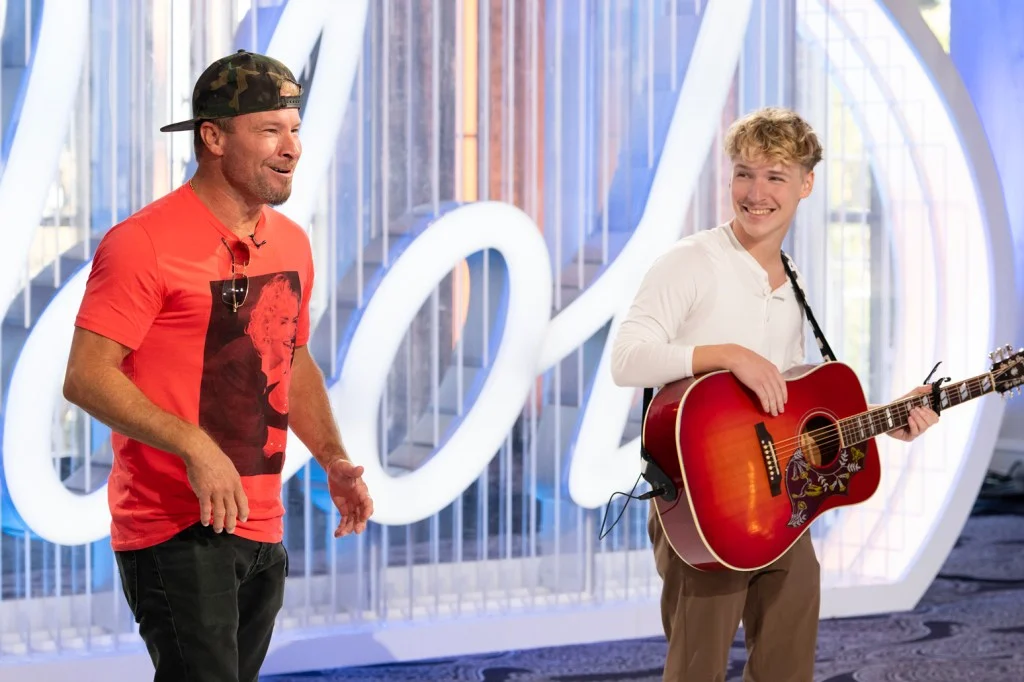
Brian Littrell‘s love for his son Baylee is clearly larger than life. The Backstreet Boys singer’s 22-year-old son Baylee Littrell auditioned for season 23 of American Idol, debuting on the show last month and surviving all the way to this week, before he was eliminated just shy of the top 14 contestants on Monday night. […]

The 2025 inductees into the Rock & Roll Hall of Fame will be announced on a live episode of American Idol on Sunday (April 27). Show host Ryan Seacrest will make the eagerly awaited announcement. James Taylor, who was inducted into the Rock Hall in 2000, will serve as a mentor on the episode, on […]

 State Champ Radio
State Champ Radio 